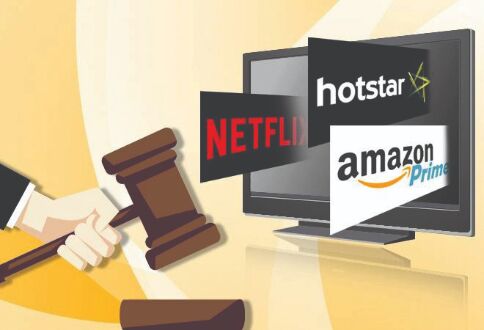Regulation or artistic restriction?
Bringing digital news and OTT platforms under the aegis of the I&B ministry could mean greater moral policing and censorship

With much of the Indian media coming under the glare of criticism in the last few years, it has been a handful of digital news platforms that have kept checks and balances in place and maintained our faith in the sanctity of the fourth estate. When under political pressure some mainliners were asked to bend, they crawled; not that they should have bent either. Attacks on the objectivity and integrity of certain news channels and newspapers also reached a crescendo with many times, advertisers (if not political parties) calling the editorial shots. With the journalistic profession under attack from internal and external forces, the mushrooming of small yet independent media outlets have been heartening. Therefore, the Information and Broadcasting Ministry's decision to bring digital news platforms and over-the-top (OTT) platforms under its purview has raised fears of censorship and moral policing.
Recently, 11 digital news platforms formed DIGIPUB News India Foundation. While its primary aim is to create a vibrant ecosystem for digital news while upholding journalistic values, the body would also fill the lacuna that existed in terms of appropriate representation. While the Press Council of India and Editors Guild of India stepped in from time-to-time to raise issues facing journalists, there was a glaring need for a digital-focussed body that would speak up for new age journalism. After all, some of these media outlets have faced
the short end of the stick for their investigative journalism and fake news busting campaigns.
The Centre amended the Allocation of Business Rules, 1961 to cast its overarching influence on digital news mediums. While the I&B ministry insists that it will bring all media on a level-playing field, murmurs of disbelief are being heard. Would coming under the central ministry mean losing its voice or being hauled up for stories that are not music to powerful ears? Well, first and foremost, the digital news platforms are required to immediately get their house in order and become compliant to government norms. For starters, any digital media platform that has over 26 per cent of foreign direct investment (FDI) is mandated to reduce it by October 15, 2021. All the organisations have to also apprise the government about shareholding patterns and financials within a month.
In the Covid-19 world, OTT platforms have gained pre-eminence replacing both television and cinema halls. Movie goers prefer the safe, sanitised confines of their homes prompting big-ticket film releases happening directly on OTT platforms. These platforms have also invited controversy with some of their socially explosive content. Even though streaming platforms such as Netflix and Amazon Prime along with 13 others had promised to adhere to self-regulation, the Indian government has been unimpressed.
In India, we love to regulate everything. First, we allow a sector to grow wings, and just as it's about to take flight, we bring out the big ol' regulatory scissors and go snip! It happened with e-commerce, cab aggregators, online grocery, food delivery, and so on. Our regulations work in retrospect and while rules are necessary for business, regulating content is opening a Pandora's box of what is and isn't acceptable to our moral standards. Who decides these moral codes? And why not browse past that which is offensive to our ideals rather than stopping it altogether?
I'll confess that I'm not prudish about nudity or aesthetically depicted sex scenes and don't mind some blood and gore, though too many expletives do make me squirm, one can't help but wonder if the government regulation would now mean curtailing the artistic expression of web series and filmmakers. One can only conjecture if there would be more intrepid web series such as 'Paatal Lok' and 'Leila' that stirred quite the storm. Netflix is already airing a censored version of 'The Vikings' in India with shorter episodes and blurred shots of pork. So, it is no surprise that filmmakers in India are a worried lot because not only would it mean curbing unhindered storytelling but also lead to piracy to download uncensored content.
As I was told by a senior filmmaker recently, OTT platforms are wary already. Having learnt from the numerous legal cases filed on them, many are already steering clear of contentious content. Sure, you may get to see 'bold' sex scenes but the ones with bolder thoughts that upset the socio-economical apple cart of India, will well and truly be hidden away. Therefore, while self-regulation was already restricting creative freedom, being placed under the I&B ministry will all but kill it. And the government may not even have to do anything. Today, no one wants to be unnecessarily hassled; artists included.
The writer is an author and media entrepreneur. Views expressed are personal



